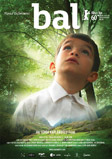William Sherwood / Subtitled Online
DVD: Yumurta
Yumurta is being released as part of The Yusuf Trilogy box set.
The first instalment of Semih Kaplanoglu’s trilogy about Yusuf the poet is a slowly executed story of a young’s past finding and reconnecting with him. Tinged with elements of the surreal and moments of stunning beauty, is Yumurta a stunning visual poem or a hopelessly boring endurance test with no reward?
On a misty day in the Turkish countryside, an old woman ambles toward the screen, pauses, and walks off toward the hazy mirage of what might be trees in the distance. In an Istanbul book shop, Yusuf, the owner, gets a call telling him to hurry to Tire because his mother has passed away. Dealing briefly with a very attractive female customer who does not heed opening and closing hours, Yusuf takes the long drive from his big, cosmopolitan city life to the quiet country town of his childhood.
After seeing the funeral through, Yusuf has the first in a series of strange episodes, dreams from which he wakes violently. Deciding to stay on to sort out a few post-death arrangements, Yusuf meets his cousin Ayla. She had been looking after his mother for the last few years and staying in the house, as Yusuf plans to do. It isn’t long before he thinks it best to go home, but Ayla tells him he cannot until he fulfils his dead mother’s last request: to sacrifice a ram on her behalf. Not really believing in that sort of thing, he attempts to delegate, then to postpone, but eventually gives in to the desires of Ayla and those beyond the grave, and the draw of his childhood home begins to take its unshakable hold…
Yumurta has won a small treasure trove of awards for almost every phpect of filmmaking that there is to be rewarded with prizes. This film, however, seems to be one that delighted critics but frustrated, even angered those who sought it out after catching wind of its accolades. With regards to its performance in categories such as Art Direction and Camera Direction, it obviously deserves praise, but sympathetic feelings begin to emerge for the disgruntled home audiences when it also gets awarded Best Screenplay and Best Costume Design because with them comes excess baggage.
Moving, witty, or at least interesting dialogue, in some vague way, is imagined, along with period clothing, or at least something stylish that makes you take notice. Or anything other than what is delivered. The reality is a script that might make up a ten minute short and clothes that are simply clothes. Neither of these things would be so detrimental to how this film has been received if they didn’t somehow get awards, but they did, and it has raised expectations beyond what it delivers. Wishing in no way to besmirch the good names of the film festivals it faired so well in, it might do for some viewers to not rely so readily on their judgement and go into this film with an open mind.
“Yumurta is a languorous film that takes its time to get where it wants.”
So, Yumurta is a languorous film that takes it time to get where it wants, and doesn’t care if the viewer begins to get itchy feet. Nejat Isler is engaging as Yusuf when he has something to engage an audience with, but a lot of the time he is simply sitting and looking at the floor, or his food, or smoking a cigarette, or falling asleep. It would be neat to say that the slowness is reflective of the circumstances Yusuf finds himself in, namely the quiet town of Tire where nothing happens too fast. His first appearance, however, finds him reading alone in his bookshop after closing time. Stillness lies just as heavily here because it emanates from Yusuf’s poetic temperament, immune to the bustling cacophony of Turkey’s largest city.
Saadet Isil Aksoy portrays cousin Ayla well, but again, there is not much for her to do but ask Yusuf whether he would like tea and go from room to room in an attempt to populate Kaplanoglu’s empty spaces. Having met up with Haluk, a boy who is not enjoying the prospect of Ayla leaving Tire for university, one gets a little over enthusiastic at the prospect of some emotions coming to the surface and livening up the script, but Ayla cuts off their meeting in anticipation of this and goes home. This can be said of any scene where it looks as though some solid interaction is about to take place. In each instance, the character in Ayla or Yusuf’s life is willing to engage them in actual discussion or chit-chat, but Ayla and Yusuf are the ones incapable of divulging much beyond looks or one word answers. Only at one point is anyone less talkative than these two, and that is only because Haluk is embarrassed to be in the house where the woman who jilted him lives.
Gradually, as the film presses onwards, Ayla and Yusuf ease up to each other’s company. Yusuf is opening himself up more and more to his past and Tire finds little ways of distracting him from returning home immediately. In a sense, it is strange that he should feel so benevolent toward the town because he suffers some slightly distressing episodes once there. He dreams of dropping an egg and wakes up just before it cracks, in the woods. He later collapses in unexplained circumstances, is held at bay by a massive dog in a field that is nowhere to be seen once awake, and he also gets stuck down a well. In each case, the audience is only aware that what they have seen is a dream when Yusuf awakes, but it is also never made explicit that he has been dreaming. Only in following the general interpretation of the language of film can one say that Yusuf had been asleep.
The effect of these episodes is to add a mysterious layer that is entirely absent everywhere else in the film. What ensues is a lot of head scratching for the immediate ensuing couple of minutes, but is then forgotten as the oppressively silent non-script returns. It would seem as though there had been plenty of space given to ponder these strange occurrences, but it actually has the effect of distracting the viewer by making them scream for some dialogue or plot.
At its heart is an old story of a son returning home and finding himself growing to like where he has landed; Tire, in one sense, being all that is left of his mother, the egg from which he hatched. There is food for thought in the return to the womb being the opposite story to the usual one of the youngling questing out to make a life away from the nest, but it is ultimately far too protracted in length to give much satisfaction.
What is occasionally redeeming is some of the beautiful shots that have been photographed. In the very beginning, the old woman, perhaps Yusuf’s mother, walks toward a silhouetted structure shrouded in fog. It looks like trees, but it also looks like a shadowy version of the emerald city from the Wizard Of Oz far away in the distance. The framing has had special attention paid to it in almost every scene, and of particular beauty is the lake Yusuf and Ayla visit, the day after they first arrive. A few breathtaking images cannot, however, prop up an hour and a half of laborious storytelling.
Yumurta attempts to make poetry out of its silence and makes no concessions to easily distracted minds. Dealing in images, it somehow fails to produce a winning hand and easily slips into being a boring film rather than a ponderous one. It undoubtedly holds much to think about in retrospect, but nowhere near enough has been done to keep bums on seats. This deserves the attention of the ultra patient, but its amassing of awards has sucked in the unassuming in a way the film probably didn’t intend to, and that the unassuming have resented. 2 Star
|
|
|




